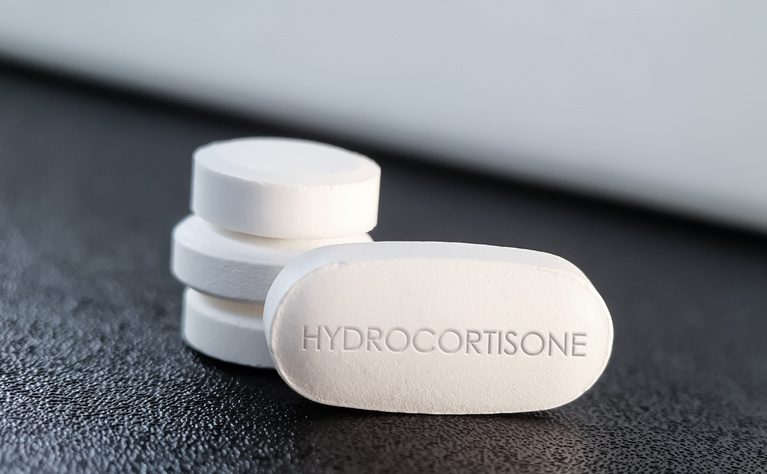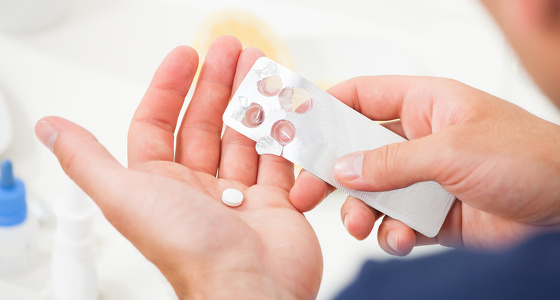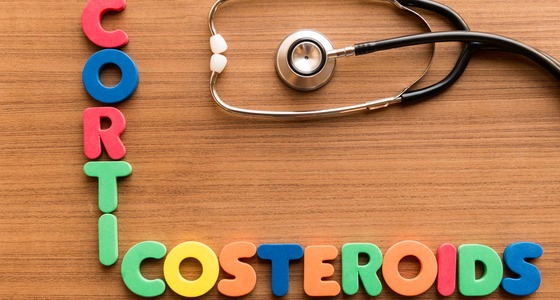Hydrocortisone is a type of steroid given to people with inflammatory bowel diseases. Learn more about it in this article.

Hydrocortisone is a type of corticosteroid (or steroid) used to help treat patients with inflammatory bowel diseases, such as Crohn’s disease and ulcerative colitis. Steroids are a simulated (man-made) version of the hormone cortisol which is made naturally in your adrenal glands. Cortisol has lots of functions in the body, including being your body’s main stress hormone and acting as an anti-inflammatory.
It is used for a short period of time to induce remission (get you well) before being slowly stopped. You will often take another medication which will work to keep you in remission (a maintenance therapy).
Hydrocortisone works as both an anti-inflammatory and an immunosuppressive medication. This means it both reduces inflammation in your body and suppresses your immune system.
When you take a steroid such as hydrocortisone your body reduces or stops producing cortisol naturally as it gets all the cortisol it needs from your medication.
Steroids, such as hydrocortisone, are a common first medication prescribed to patients with Crohn’s disease and ulcerative colitis. It is a fasting-acting medicine which works to reduce the symptoms and inflammation of IBD flares.
They are typically given to patients shortly after diagnosis of IBD or when symptoms return which can’t be managed by another medication.
Steroids are not a long-term medication and you may only take them for three to six weeks.
Like most drugs hydrocortisone can also be known by different brand names, depending on the preparation of the drug. The brands of hydrocortisone most commonly used to treat IBD include:
Hydrocortisone can be taken in a few different ways, depending on the preparation you are prescribed. When your doctor is considering what may work best for you they will consider several factors, including the location and severity of your disease.
Hydrocortisone tablets are taken orally (by mouth) every day. You will usually take them for a period of three to six weeks before tapering off them (slowly reducing your dose). You may be given a slow release tablet. You should not chew or crush these tablets or eat grapefruit (or drink grapefruit juice) as it may stop them from working effectively.
An intravenous hydrocortisone infusion, where it is given directly into a vein, usually takes place in hospital in people who are experiencing a severe flare of their IBD. You may have several infusions over a short period of time to try to get your flare under control before moving onto another treatment to continue to manage your symptoms.
Topical rectal treatments come as foam, liquids or suppositories you insert into your backside to treat the inflammation from your IBD directly. They are prescribed to people who have inflammation in the lower part of their colon, rectum and anus. The foams and liquids come in special cans with applicators which you insert into your anus and discharge into your body. Many people feel uncomfortable with the idea of doing this and that’s perfectly normal. However, rectal treatments are often more effective than systemic (whole body) treatments as they target the inflammation directly and come with less side effects. To help you could try taking the treatment in the evening when you are more relaxed and do it lying down.
You place these tablets next to ulcers in your mouth and let them dissolve. You should not chew or swallow these tablets whole. Mouth ulcers tend to be more common in people with Crohn’s disease than ulcerative colitis.
If you forget to take your hydrocortisone you should take it as soon as you remember, however if this is when your next dose is due you should skip the missed dose. You should never take a double dose. If you aren’t sure what to do then speak to your IBD team.

Corticosteroids are a fast-acting medication, with patients often feeling some reduction of symptoms within a few days or a week. Although they are effective for many patients, they will not work for everybody. If this is the case for you then you may be asked to try a different type of steroid or another medication altogether.
Even if you do start to feel well after a few days it’s important you continue to take the full course of your steroids as prescribed. This includes reducing the dose slowly at the end of your course to allow your body to start producing the cortisol it needs naturally. If you don’t do this you could become very unwell.
The side effects you may be at risk of developing depend on the type of hydrocortisone you are taking. If you are taking systemic hydrocortisone (as tablets you swallow, or through an IV infusion) you are at a higher risk of side effects, while localised hydrocortisone (such as rectal or topical) has a lower risk of side effects.
Some of the common side effects of taking hydrocortisone tablets include1:
Some of the more serious side effects which can happen, particularly if you are on a high dose for a long period of time include1,2:
Rarely, people experience an allergic reaction to hydrocortisone. If you experience a skin rash, are struggling to breath, your mouth, lips, tongue or face start to swell then you should get urgent medical help.
Side effects when using topical hydrocortisone (such as rectal preparations or buccal tablets) are less common.
Some people do experience redness, burning or itching in the area they’ve used the medicine. In some cases the immune system can become weaker, meaning you may be more likely to get infections.
Topical hydrocortisone treatments can sometimes get into your bloodstream, which may mean you could experience one of the more serious side effects. You are at higher risk of this if you are taking hydrocortisone long-term.
Hydrocortisone is often prescribed at the same time as other medications to treat your IBD. These may include 5-ASAs (such as mesalazine), an immunomodulator (such as azathioprine) or a biologic (such as adalimumab or infliximab). This is because steroids are used as a fast-acting treatment for when you are experiencing a flare up of your IBD. Once your symptoms are under control you will slowly come off the hydrocortisone and one of these other medications will be used to try to keep you well (known as a maintenance therapy).
If you are taking any other prescribed medications or over-the-counter medicines, including pain relief, herbal and complementary medicines, you should let your doctor know before starting hydrocortisone. Many medications interact with hydrocortisone, preventing it from working in the way it should.
Having IBD doesn’t increase your risk of contracting COVID-19, however some of the medications you take can increase your risk of developing complications if you contract coronavirus. This includes systemic hydrocortisone (oral tablets and IV infusions) as they reduce the activity of your immune system.
However, you shouldn’t stop taking your hydrocortisone or change how you take it without talking to your IBD team first. Stopping them suddenly can make you very ill and/or could cause your Crohn’s disease or ulcerative colitis to flare, which could also place you at risk of serious health issues.
Hydrocortisone is now being used to treat some people who are seriously unwell in hospital with COVID-19. The timing and dosage of steroids used to treat coronavirus is very different to how steroids are given to treat IBD and there is no evidence to suggest that hydrocortisone taken for your inflammatory bowel disease will help if you catch COVID-19.

